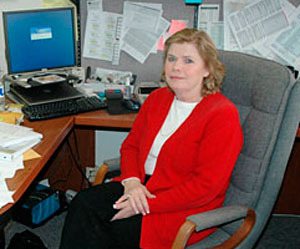MARYSVILLE — When Mary Swenson started working for the city of Marysville in September of 1977, the Marysville City Hall and Council Chambers occupied one corner of what’s now the Ken Baxter Senior Community Center, along with the local library and the police department’s offices, dispatch center and jail.
“A typical Tuesday night here would include court at 6 p.m., a board of adjustment meeting at 7 p.m. and a planning commission meeting at 7:30 p.m.,” Swenson said. “The city itself was very small back then. Our northern boundary was around 76th Street, and our eastern boundary was around 51st Avenue. When I started working for the city, there was a 4-to-3 vote of the Council to move the library to Grove Street, which was considered so far out of town back then.”
In the more than 32 years since, Swenson has seen Marysville grow to become the second-largest city in Snohomish County, which has given her so much to do that her work with the city will continue for a bit even after her official retirement March 31. In addition to her ongoing efforts to trim the piles of remaining paperwork on her desk, Swenson will return to serve as a consultant to the city from April through June, through the Seattle-based Prothman consulting firm, to assist Gloria Hirashima in taking over Swenson’s role as the city’s chief administrative officer, as well as to aid the city in pre-preparation for its 2011 budget.
“I never thought I’d stay this long,” said Swenson, who was first hired by the city as a clerk typist after she responded to a job posting in an unemployment office. “The city was so small for so long that it was more like a family, but as it’s grown, it’s grown that many more opportunities as well. Our mayors and City Council members have shown a lot of foresight in determining our direction over the years. Even years ago, we had utilities extending all the way up to Island Crossing.”
Swenson has seen six mayors and 39 City Council members during her time with the city. She waxed nostalgic about the Marysville she first encountered, a bedroom community of strawberry fields and operating mills, with a City Hall whose most advanced technology was an IBM Selectric typewriter.
When asked about the city’s greatest achievements and its most problematic issues during her tenure, Swenson included Marysville’s dealings with Arlington and the Tulalip Tribes in both categories. She acknowledged that tension stemmed from the question of Smokey Point’s jurisdiction, and the complexities of the Tulalip reservation’s economic development and sovereign status, but she also touted the positive progress that she’s seen in Marysville’s partnerships with both Arlington and the Tribes.
“A city must have strong relationships with its neighbors in order to succeed,” Swenson said. “You don’t always have to agree, but it’s how you behave when you don’t agree that matters.”
Swenson credited former Snohomish County Executive Bob Drewel’s mediation with helping to resolve what she deemed the polarization between Marysville and Arlington elected officials over Smokey Point, and noted that Marysville ultimately benefitted from a partnership for water, that it had initially resisted, with the Tribes, Everett and the Snohomish County Public Utility District.
Swenson also expressed pride in the city’s economic development, again citing its ties to the Tribes as a key to its success.
“When the Tribes started Quil Ceda Village, our relationship with them was not strong,” Swenson said. “We had no understanding of what they were doing. What we’ve come to understand is that what they do can compliment what we do, and vice versa. We’re both about getting more retail and more jobs here.”
Swenson likewise deemed the city’s annexations as “balancing” both its retail and its housing, and took pride in helping forge an economic development committee, made up of community members who were willing to tell city employees things that, in some cases, were not easy to hear.
“Whether they were merely misperceptions or actual problems, their concerns needed to be addressed and fixed,” Swenson said.
Swenson expressed confidence in Hirashima’s qualifications, as well as in the common sense of the City Council and the bridge-building that Marysville Mayor Dennis Kendall has conducted during his terms of office.
“It’s all about the citizens,” Swenson said. “If we’re not building those relationships, then the taxpayers are not getting what they deserve. I wouldn’t have been as successful as I was without the support of my husband and kids.”



